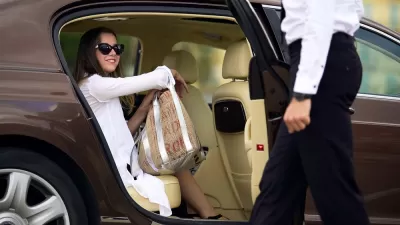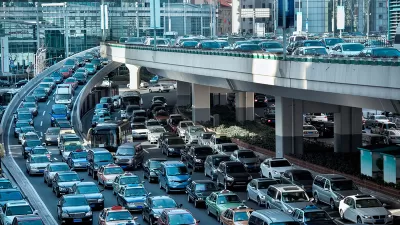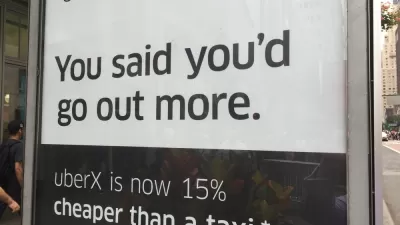New research published in Transport Policy finds that ride-hailing companies increase vehicle miles traveled of users by 97 percent in Chicago, 114 percent in New York City, and 118 percent in San Francisco.

[Updated January 27, 2020] New analysis by Schaller Consulting, published in the Transport Policy journal, quantifies the effect of ride-hailing companies on the amount of automobile travel (measured by vehicle miles traveled) by users.
Kea Wilson provides analysis of the new study, noting that the study accounts for "all the miles that drivers spent circling or heading to their pickups — aka dead-heading," in addition to the amount of time drivers spend in route to a paying customer's destination. The non-customer driving is significant: dead-heading "accounts for as much as 48 percent of the average e-taxi driver’s total mileage in some cities," according to Wilson's explanation of the report's findings.
Wilson summarizes the realities of ride-hailing, as indicated by the study's findings:
In every region in the study, the customers of transportation network companies at least doubled their total vehicle miles travelled compared to the modes they told researchers they would have taken had Uber and Lyft not been around. Schaller found collective VMT increases of a whopping 97 percent in Chicago, 114 percent in New York City, 118 percent in San Francisco, 157 percent in Boston, and 118 percent in the California suburbs.
Ride-hailing companies have the tools to limit this excess driving, however. Pooling rides, an optional service offered by the major ride-hailing companies, reduces vehicle miles traveled significantly.
As noted by Wilson, the study isn't the first to quantify the ways in which ride-hailing companies increase driving, rather than delivering reduced vehicle miles traveled as some had hoped when the business model went mainstream. A recent study showed that ride-hailing companies induce car ownership, and thus more driving. An earlier study showed that ride-hailing companies poach transit ridership.
FULL STORY: Study: Taking An App Taxi More than Doubles Your Roadway Impact

Planetizen Federal Action Tracker
A weekly monitor of how Trump’s orders and actions are impacting planners and planning in America.

Maui's Vacation Rental Debate Turns Ugly
Verbal attacks, misinformation campaigns and fistfights plague a high-stakes debate to convert thousands of vacation rentals into long-term housing.

San Francisco Suspends Traffic Calming Amidst Record Deaths
Citing “a challenging fiscal landscape,” the city will cease the program on the heels of 42 traffic deaths, including 24 pedestrians.

Amtrak Rolls Out New Orleans to Alabama “Mardi Gras” Train
The new service will operate morning and evening departures between Mobile and New Orleans.

The Subversive Car-Free Guide to Trump's Great American Road Trip
Car-free ways to access Chicagoland’s best tourist attractions.

San Antonio and Austin are Fusing Into one Massive Megaregion
The region spanning the two central Texas cities is growing fast, posing challenges for local infrastructure and water supplies.
Urban Design for Planners 1: Software Tools
This six-course series explores essential urban design concepts using open source software and equips planners with the tools they need to participate fully in the urban design process.
Planning for Universal Design
Learn the tools for implementing Universal Design in planning regulations.
Heyer Gruel & Associates PA
JM Goldson LLC
Custer County Colorado
City of Camden Redevelopment Agency
City of Astoria
Transportation Research & Education Center (TREC) at Portland State University
Jefferson Parish Government
Camden Redevelopment Agency
City of Claremont





























